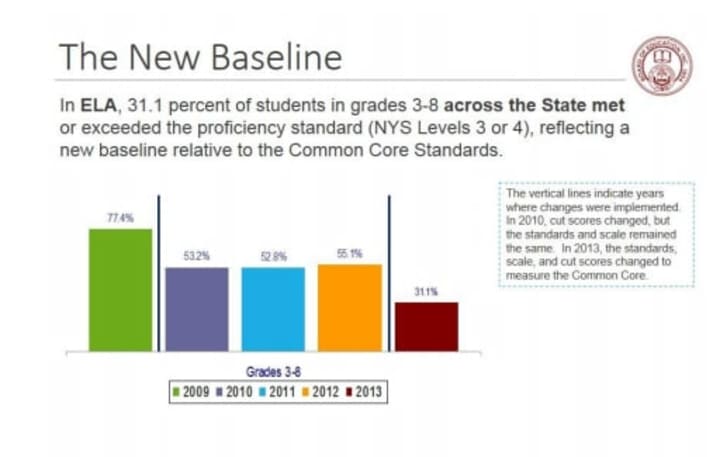Johnson was joined by concerned parents, educators and administrators in the Van Buren Hearing Room in Albany to outline problems Mount Vernon has seen with the new Common Core Standards for education.
Students in Mount Vernon were among the lowest scorers on state mandated math and language arts proficiency tests that were administered last spring. While approximately 40 percent of Westchester County students in grades 3 through 8 showed proficiency in the two subjects, Mount Vernon cumulatively averaged just 13.8 percent proficiency.
The Common Core Learning Standards have been the cause of a lot of derision in recent weeks, with state officials calling for a curtailing of their implementation.
“The debate about the Regents Reform Agenda needs to be broadened to re-examine the purpose of public schools,” Johnson said. “[Our] district’s efforts to prepare students for a meaningful, productive adult life continue to yield very mixed results.”
Johnson stressed that financial inequalities are one constant that continue to plague school districts. During her presentation to the committee, she emphasized that high poverty schools are directly correlated with lower academic performance.
In Mount Vernon, as of June, 75 percent of Mount Vernon students are living in poverty, which is defined as a family of four having an income of $23,550.
“Children born into poverty are less likely than their well-off peers to have acquired the literacy skills that are identified with school readiness,” she added. “The longer they stay in school, the further behind they fall in reaching the levels of meeting proficiency on state administered exams.”
Johnson said that the district supports “preventative cost measures, such as robust early childhood programs and wrap around services to support the needs of children,” but is against “fiscal legislation and tax formulas that restrict school district revenues, yet coincide with unfunded mandates.”
Ideas the district proposed to close the gap include a cost-benefit analysis of state testing, a more equitable funding formula and a study of the impact that the income gap has on student learning.
Eulyse Cooper, 42, who has one child enrolled in the high school, said that she supported any motions that provide the district with further funds.
“We’re like an underdog. We have so many students, and yet our schools never have any money,” she said. “There’s something to be said when districts half our size have double the funding.”
Other topics covered at the hearing included a discussion on the merits of the Common Core Learning Standards, the amount of state testing students endure, professional development and teacher evaluations.
“It’s time for a pause. It’s time to evaluate our efforts,” Johnson said. “Problems that affect the very core of democratic classrooms have surfaced and the first step to solving a problem is to recognize we have a problem.”
Click here to follow Daily Voice Mount Vernon and receive free news updates.


